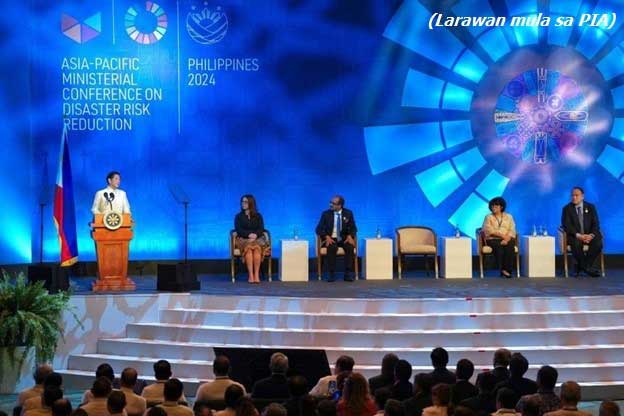MANILA, (PIA) — President Ferdinand R. Marcos Jr. opened the 2024 Asia-Pacific Ministerial Conference on Disaster Risk Reduction (APMCDRR) on Tuesday, Oct. 15, calling for increased investments in disaster risk reduction (DRR) and regional cooperation to combat climate change and natural disasters.
Speaking at the Philippine International Convention Center, Marcos emphasized, “We must significantly increase our investments and develop financing mechanisms in disaster risk reduction. Sustained and predictable data and financing would help address disaster risks better.”
“This entails ensuring that developing countries, particularly the least-developed countries, landlock countries, and small island developing states, are provided greater access to these resources to advance their policies and build disaster resilience,” he added.
Marcos highlighted the region’s vulnerability to natural disasters, citing damages incurred by the Philippines recently, during the onslaught of Typhoon Gaemi (locally known as Super Typhoon Carina), that cost over $82 million (P4.727 billion) in agricultural losses.
“We share a common struggle: navigating the balance between continued economic growth and dealing with the ever-present threat of disasters,” Marcos said, stressing the need to balance economic growth with disaster risk reduction in the Asia-Pacific, and then citing the unwavering spirit of its people.
“From the tsunami in the Indian Ocean to Typhoon Haiyan in the Pacific Ocean. From the earthquakes in Nepal to floods in South Asia, our nations have conquered monumental challenges,” he added.
Moreover, the President outlined other key steps for the region’s “Surge to 2030” initiative, which include embracing inclusion for vulnerable populations; addressing climate-induced displacement; prioritize technological innovation; improving coordination among stakeholders; fostering open dialogue; and engaging the private sector.
The conference running through October 18, hosted by the Philippines in cooperation with the United Nations Office for Disaster Risk Reduction (UNDRR), aims to accelerate implementation of the Sendai Framework for Disaster Risk Reduction in one of the world’s most disaster-prone regions.
According to the UNDRR, investment in disaster risk reduction is indispensable for enhancing resilience and for achieving sustainable development.
The guiding principle of the Sendai Framework for DRR stresses that disaster risk informed investments are more cost-effective than primary reliance on post-disaster response, and recovery, and contribute to sustainable development, it added. (PIA-NCR)

